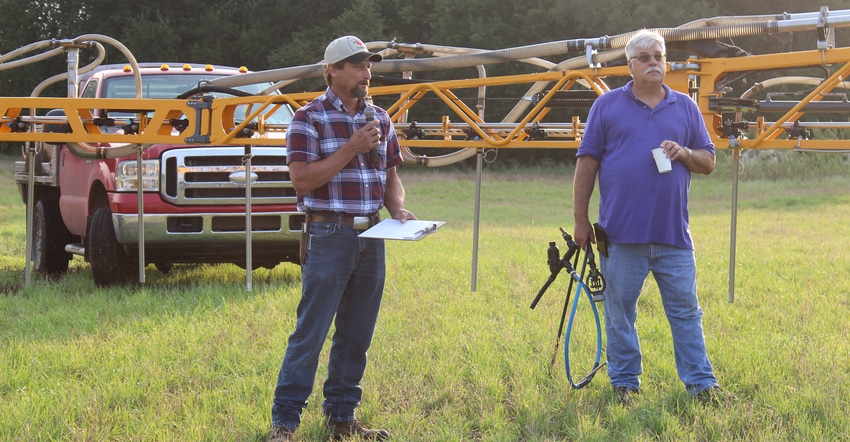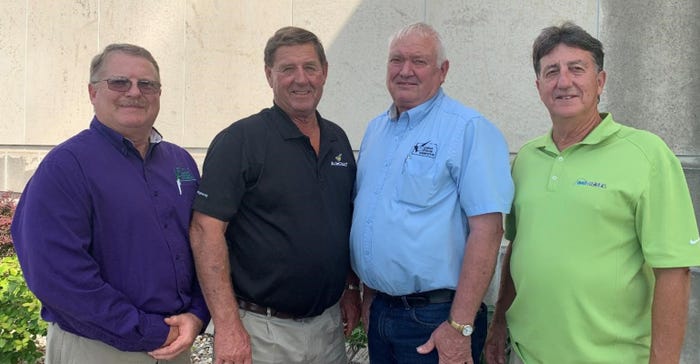August 10, 2022

Four finalists have been selected for the 2022 Kansas Leopold Conservation Award,, according to the Sand County Foundation. Given in honor of renowned conservationist Aldo Leopold, the award recognizes farmers, ranchers, forestland owners and other landowners who inspire others with their dedication to the land, water and wildlife resources in their care.
The foundation and national sponsor American Farmland Trust present the Leopold Conservation Award to private landowners in 24 states for extraordinary achievement in voluntary conservation. In Kansas, the award is presented annually with additional support from the Kansas Association of Conservation Districts and Ranchland Trust of Kansas.
The Kansas Leopold Conservation Award will be presented at the Kansas Association of Conservation Districts’ 78th Annual Convention in Wichita in November. The recipient will receive $10,000 and a crystal award.
The finalists are:
Ray and Susan Flickner, Wichita. The Flickner family farms in McPherson, Hodgeman, Dickinson and Norton counties. They installed subsurface drip irrigation technology to become more efficient with water and nutrient applications on crops. They experiment with cover crops to improve water infiltration and suppress weeds. Their Flickner Innovation Farm is a collaboration among university, industry and agency partners, where new methods to improve soil health and conserve water are demonstrated.
Kevin Karr family, Emporia. The Karr family raises crops and hogs in Lyon County. To reduce soil erosion, Kevin began using no-till practices in the 1980s. He credits no-till with enhancing wildlife habitat and reducing his fuel use while building better soil structure. Weeds are naturally suppressed by planting cover crops of rye, while beneficial insects are attracted to flowering cover crops. The combination of no-till and cover crops has bolstered the farm’s resilience to drought.
Michael Thompson, Almena. Michael has implemented conservation practices at Thompson Farm and Ranch in Norton County, where he farms with his father, Richard, and brother Brian. By rotationally grazing their beef cattle, the Thompsons are improving the landscape of native range pastures and fields of cover crops. Michael’s a vocal advocate for soil stewardship among other farmers and ranchers via speaking engagements, social media and a program geared toward youth.
Glenn and Barbara Walker, Brookville. The Walkers are improving soil health, wildlife habitat and water distribution on their properties in Ellsworth, Lincoln, Rice, Russell and Saline counties. By using rotational grazing to feed their beef cattle, they are also managing grassland to improve habitat for greater prairie chickens, turkeys and deer. Their investment in removing invasive red cedar trees is improving water resources. Several of their properties are enrolled in the Kansas Walk-in Hunting Access program.
New soybean commission leadership
The Kansas Soybean Commissioned ended its Aug.2 meeting with a new team of officers.
Ron Ohlde stepped into the chairman position. He raises soybeans, corn, wheat, sorghum and cattle with his sons near Palmer. Keith Miller, Great Bend, accepted the vice chair position. He grows soybeans, wheat, corn, grain sorghum and alfalfa hay. Gary Robbins, who farms near Havensville, stayed in the secretary position. He farms with his wife and son growing soybeans, corn, wheat and hay, and they raise background steers. And Raylen Phelon was elected treasurer. He farms near Melvern alongside his wife and son; they grow soybeans, corn, wheat, hay and manage a cow and calf herd.
Additional annual meeting business included funding a beef cattle feeding study at Kansas State University, approving the position description and timeline for a new assistant research contractor and hearing reports from organizations supported by commission funds.
Kansas soybean commissioners will convene again from Dec. 15 to 17 in Topeka to review funding proposals and make fiscal year 2024 funding decisions.
Broadband grants
The Kansas Office of Broadband Development recently announced the Capital Project Fund: Broadband Infrastructure Program that will offer $83.5 million in grants to provide Kansas homes and businesses access to high-speed internet through the expansion of broadband infrastructure. The program is funded through the American Rescue Plan Act Coronavirus Capital Projects Fund (CPF).

The program was developed to bring broadband infrastructure that will deliver speeds that meet or exceed symmetrical speeds of 100 Mbps (megabits per second) to unserved areas across Kansas. All locations within the census blocks being served and funded through this program will be required to adhere to the minimum speeds listed above. Fiber-optic infrastructure projects that focus on achieving last-mile connections will be prioritized. Middle-mile connections will be funded only if required for the last-mile build.
The Capital Project Fund program is intended to address the following priorities:
broadband infrastructure deployment designed to directly enable work, education and healthcare monitoring
critical needs that resulted from or was made apparent or exacerbated by the COVID-19 public health emergency
critical needs of the community to be served by it
Entities eligible to apply for the CPF Broadband Infrastructure Program include internet service providers, local governments, cooperatives and nonprofit organizations.
The application window opened on July 25, and will remain open for four weeks.
A full list of program guidelines and the application are posted on the Office of Broadband Development’s website.
Bonuses for child care staff
The Kansas Department for Children and Families (DCF) and the Kansas Department of Health and Environment (KDHE) are working in partnership with Child Care Aware to distribute bonuses for eligible child care staff at licensed facilities as a reward for their incredibly essential hard work. A total of $53 million is available in Child Care Workforce appreciation bonuses that will soon be directly distributed to approximately 22,650 early childhood care staff members across Kansas, and applications are now open. Individual bonus amounts will range from $750 to $2,500 per person.
The Child Care Workforce Appreciation Bonus Program is made possible with funds from the American Rescue Plan Act of 2021. The funds were awarded to DCF and will be administered by KDHE.
Eligible child care providers must be regularly working in a paid position at a licensed facility, and have a minimum of six months of continuous employment at their current employer or six months of combined continuous employment with a licensed provider. Home-based and relative providers may also qualify for the bonus program. There is also an opportunity for those who have worked less than six months at a licensed facility to receive a bonus.
For more information on this program and how to apply, visit ks.childcareaware.org/grants.
You May Also Like




